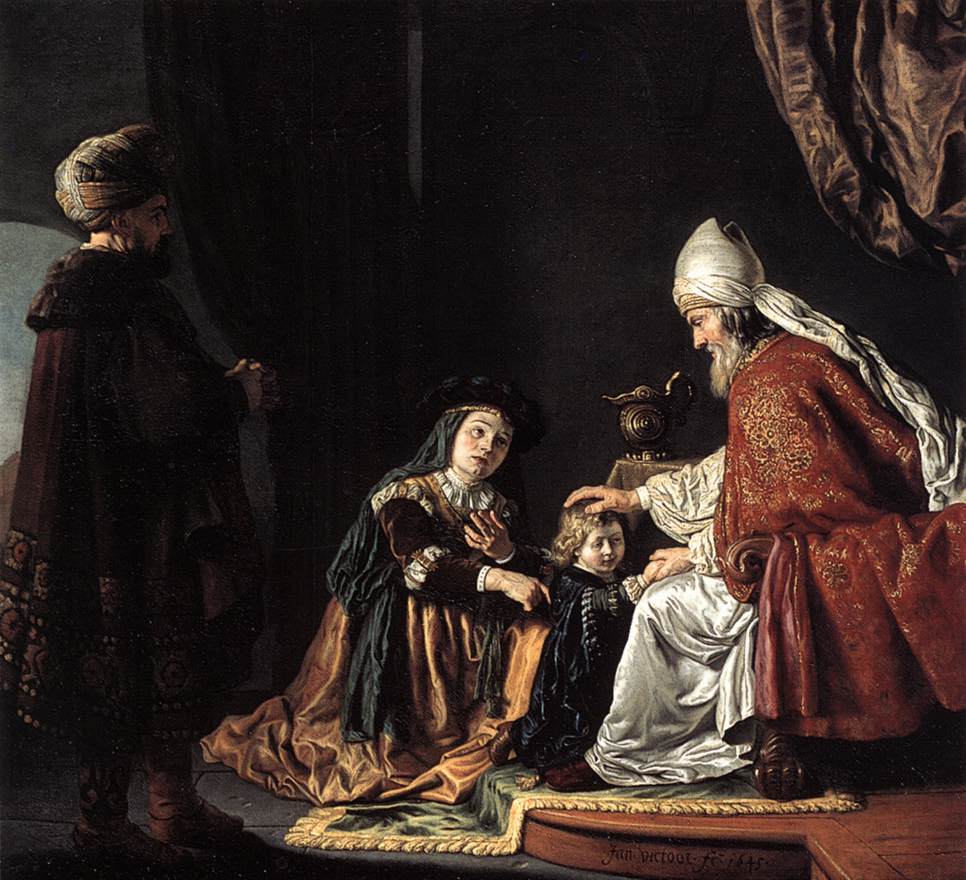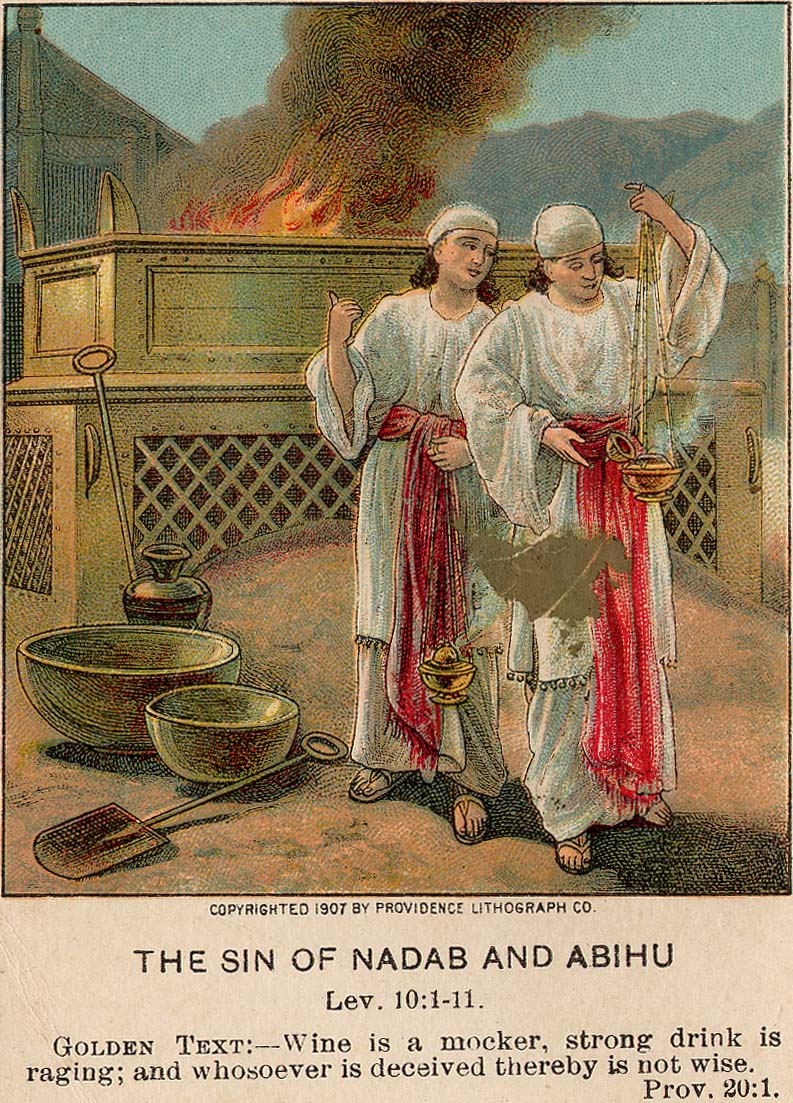|
Ithamar
In the Torah, Ithamar () was the fourth (and the youngest) son of Aaron the High Priest."Ithamar", ''Encyclopaedia Biblica'' Following the construction of the Tabernacle, he was responsible for recording an inventory to ensure that the constructed Tabernacle and its contents conformed to the vision given by God to Moses on Mount Sinai. Kohen After the death of his two eldest brothers, Nadab and Abihu, when they had been punished by the Lord for performing an unauthorized incense offering, Ithamar served as a priest along with his elder brother, Eleazar, and Ithamar and Eleazar are regarded as the direct male ancestors of all Kohanim. records an incident when Moses was angry with Eleazar and Ithamar, for failing to eat a sin offering inside the Tabernacle in accordance with the regulations set out in the preceding chapters of Leviticus regarding the entitlement of the priests to a share of the offerings they made on behalf of the Israelite people. During the travels of the Israel ... [...More Info...] [...Related Items...] OR: [Wikipedia] [Google] [Baidu] |
Eli (Bible)
Eli (, ; grc, Ἠλί, translit=Ēli; la, Heli) was, according to the Books of Samuel, a high priest and Judge of the Israelites in the city of Shiloh, ancient Israel. When Hannah came to Shiloh to pray for a son, Eli initially accused her of drunkenness, but when she protested her innocence, Eli wished her well. Hannah's eventual child, Samuel, was raised by Eli in the tabernacle. When Eli failed to rein in the abusive behavior of his sons, God promised to punish his family, which resulted in the death of Eli and his sons. Later biblical passages mention the fortunes of several of his descendants, and he figures prominently in Samaritan religious tradition. Biblical narrative Eli was the high priest (''kohen gadol'') of Shiloh, the second-to-last Israelite judge (succeeded only by Samuel) before the rule of the Kings of Israel and Judah. Hannah This story of Hannah, with which the Books of Samuel begin, involves Eli. Hannah was the wife of Elkanah. She was childless. E ... [...More Info...] [...Related Items...] OR: [Wikipedia] [Google] [Baidu] |
Hill Of Phinehas
The Hill of Phinehas is a location described in the Bible :33 as being the burial place of Eleazar and Ithamar. It is associated with the location of the village of Awarta in the West Bank. Large tombs in the town have been attributed to the burial sites of Aaron's sons Ithamar and Eleazar. His grandson Phinehas is believed to be buried at the site alongside his son Abishua — the latter is especially revered by the Samaritans, who believe that he wrote the Torah. The seventy Elders are believed to be buried in a cave near Phinehas' tomb. On the western side of Awarta lies the tomb Muslims attribute to Nabi Uzeir, Ezra the scribe.Biblical Holy Places: An Illustrated Guide (2000) Gonen, Rikva. Paulist Press. pp.4 ... [...More Info...] [...Related Items...] OR: [Wikipedia] [Google] [Baidu] |
Eleazar
Eleazar (; ) or Elʽazar was a priest in the Hebrew Bible, the second High Priest, succeeding his father Aaron after he died. He was a nephew of Moses. Biblical narrative Eleazar played a number of roles during the course of the Exodus, from creating the plating for the altar from the firepans of Korah's assembly, to performing the ritual of the red heifer. After the death of his older brothers Nadab and Abihu, he and his younger brother Ithamar were appointed to the charge of the sanctuary. His wife, a daughter of Putiel, bore him Phinehas, who would eventually succeed him as High Priest. Leviticus 10:16–18 records an incident when Moses was angry with Eleazar and Ithamar, for failing to eat a sin offering inside the Tabernacle in accordance with the regulations set out in the preceding chapters of Leviticus regarding the entitlement of the priests to a share of the offerings they made on behalf of the Israelite people. As the Israelites moved through the wilderness duri ... [...More Info...] [...Related Items...] OR: [Wikipedia] [Google] [Baidu] |
Nadab And Abihu
In the biblical books Exodus, Leviticus and Numbers, Nadab () and Abihu () were the two oldest sons of Aaron. According to Leviticus 10, they offered a sacrifice with "foreign fire" before the , disobeying his instructions, and were immediately consumed by God's fire. Moses instructed Aaron and his family not to mourn, although the people at large were permitted. Background Nadab and Abihu were the first two sons of Aaron the Levite by his marriage to Elisheba, daughter of Amminadab from the tribe of Judah. They had four sons in total, the younger two sons being named Eleazar and Ithamar. During the Exodus journey, after the Israelites' affirmation of their covenant with God, Abihu and Nadab accompanied Moses, Aaron, and 70 elders up Mount Sinai. There they saw God with great clarity, walking on a pavement of sapphire stone, and shared a meal in God's presence, without being harmed as a result. Aaron and his four sons were the first priests appointed as the priestly syste ... [...More Info...] [...Related Items...] OR: [Wikipedia] [Google] [Baidu] |
Aaron
According to Abrahamic religions, Aaron ''′aharon'', ar, هارون, Hārūn, Greek (Septuagint): Ἀαρών; often called Aaron the priest ()., group="note" ( or ; ''’Ahărōn'') was a prophet, a high priest, and the elder brother of Moses. Knowledge of Aaron, along with his brother Moses, exclusively comes from religious texts, such as the Hebrew Bible, Bible and the Quran. The Hebrew Bible relates that, unlike Moses, who grew up in the Egyptian royal court, Aaron and his elder sister Miriam remained with their kinsmen in the eastern border-land of Egypt ( Goshen). When Moses first confronted the Egyptian king about the enslavement of the Israelites, Aaron served as his brother's spokesman ("prophet") to the Pharaoh (). Part of the Law given to Moses at Sinai granted Aaron the priesthood for himself and his male descendants, and he became the first High Priest of the Israelites. Aaron died before the Israelites crossed the Jordan river. According to the Book of N ... [...More Info...] [...Related Items...] OR: [Wikipedia] [Google] [Baidu] |
Phinehas
According to the Hebrew Bible, Phinehas or Phineas (; , ''Phinees'', ) was a priest during the Israelites’ Exodus journey. The grandson of Aaron and son of Eleazar, the High Priests (), he distinguished himself as a youth at Shittim with his zeal against the heresy of Peor. Displeased with the immorality with which the Moabites and Midianites had successfully tempted the Israelites () to inter-marry and to worship Baal-peor, Phinehas personally executed an Israelite man and a Midianite woman while they were together in the man's tent, running a javelin or spear through the man and the belly of the woman, bringing to an end the plague sent by God to punish the Israelites for sexually intermingling with the Midianites. Phinehas is commended by God in Numbers 25:10-13, as well as King David in for having stopped Israel's fall into idolatrous practices brought in by Midianite women, as well as for stopping the desecration of God's sanctuary. After the entry to the land of ... [...More Info...] [...Related Items...] OR: [Wikipedia] [Google] [Baidu] |
Awarta
Awarta ( ar, عورتا) is a Palestinian town located southeast of Nablus, in the northern West Bank. According to the Palestinian Central Bureau of Statistics, the town had a population of 5,623 inhabitants in 2007.2007 PCBS Census . p.109. Awarta's built-up area consists of and it is governed by a village council.Awarta Health Work Committees. Etymology According to Palestinian historian Mustafa Dabbagh, the name "'Awarta" derives from the |
Aabed-El Ben Asher Ben Matzliach
Aabed-El ben Asher ben Matzliach (Samaritan Hebrew: ''ʾĀbədʾēl ban ʾĀ̊šər ban Maṣlīyaʾ''; born 1935 in Nablus, is the current Samaritan High Priest. He assumed office on April 19, 2013. According to Samaritan tradition, he is the 133rd high priest since Aaron and in accordance with Samaritan custom, upon his death, the office automatically transfers to the oldest surviving descendant of Ithamar. Aabed-El is married and has two sons and two daughters. A successful business man, Aabed-El is the grandson of Matzliach ben Phinhas ben Yitzhaq ben Shalma Matzliach ben Phinhas ben Yitzhaq ben Shalma was the 122nd Samaritan High Priest from 1933-1943 He was succeeded by his brother Abisha III ben Phinhas ben Yitzhaq ben Shalma, both of them being members of the clan of Phinhas, descendants of Phinha ..., who was Samaritan high priest from 1933 to 1943. References Living people 1935 births Samaritan high priests People from Nablus Samaritans {{Reli- ... [...More Info...] [...Related Items...] OR: [Wikipedia] [Google] [Baidu] |
Levites
Levites (or Levi) (, he, ''Lǝvīyyīm'') are Jewish males who claim patrilineal descent from the Tribe of Levi. The Tribe of Levi descended from Levi, the third son of Jacob and Leah. The surname ''Halevi'', which consists of the Hebrew definite article "" ''Ha-'' ("the") plus ''Levi'' (Levite) is not conclusive regarding being a Levite; a titular use of HaLevi indicates being a Levite. The daughter of a Levite is a " ''Bat Levi''" (''Bat'' being Hebrew for "daughter"). The Tribe of Levi served particular religious duties for the Israelites and had political (administering cities of refuge) and educational responsibilities as well. In return, the landed tribes were expected to support the Levites with a tithe (), particularly the tithe known as the First tithe, ''ma'aser rishon''. The Kohanim, a subset of the Levites, were the priests, who performed the work of holiness in the Temple. The Levites, referring to those who were not Kohanim, were specifically assigned to * singi ... [...More Info...] [...Related Items...] OR: [Wikipedia] [Google] [Baidu] |
Torah
The Torah (; hbo, ''Tōrā'', "Instruction", "Teaching" or "Law") is the compilation of the first five books of the Hebrew Bible, namely the books of Genesis, Exodus, Leviticus, Numbers and Deuteronomy. In that sense, Torah means the same as Pentateuch or the Five Books of Moses. It is also known in the Jewish tradition as the Written Torah (, ). If meant for liturgic purposes, it takes the form of a Torah scroll ('' Sefer Torah''). If in bound book form, it is called ''Chumash'', and is usually printed with the rabbinic commentaries (). At times, however, the word ''Torah'' can also be used as a synonym for the whole of the Hebrew Bible or Tanakh, in which sense it includes not only the first five, but all 24 books of the Hebrew Bible. Finally, Torah can even mean the totality of Jewish teaching, culture, and practice, whether derived from biblical texts or later rabbinic writings. The latter is often known as the Oral Torah. Representing the core of the Jewish spiri ... [...More Info...] [...Related Items...] OR: [Wikipedia] [Google] [Baidu] |
Uzzi
Uzzi is a given name. One derivation is biblical, from ''Uzzî'' () meaning "my strength". The name can also be transliterated as Uzi. It may be a nickname for Uzza/Uzzah, Uzzia/Uzziah, and Uziel/Uzziel. Biblical characters with this name: * Uzzi, high priest of Israel ( el, Οζι in 1 Chr., Σαουια in Ezra; la, Ozi), the son of Bukki, a descendant of Aaron (1 Chr. 6:5, 51; Ezra 7:4) * Uzzi ben Sashai was the 3rd Samaritan High Priest according to Samaritan Genealogical Records. He may be identical to the Jewish High Priest, as his predecessor Bukki also may have been, although the patronyms imply different fathers which might be a product of an adoption or levirate marriage or being two different individuals According to Samaritan tradition, Usi hid the tent sanctuary of the desert wandering ( Mishkan ) in a cave on the Garizim when the Israelites introduced the cult in Shilo , which was illegitimate from the Samaritan point of view .Reinhard Achenbach : ''Sam ... [...More Info...] [...Related Items...] OR: [Wikipedia] [Google] [Baidu] |





